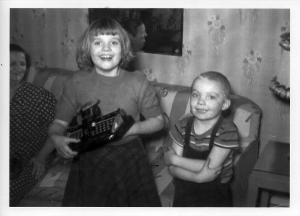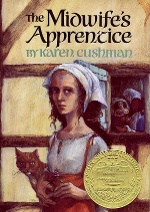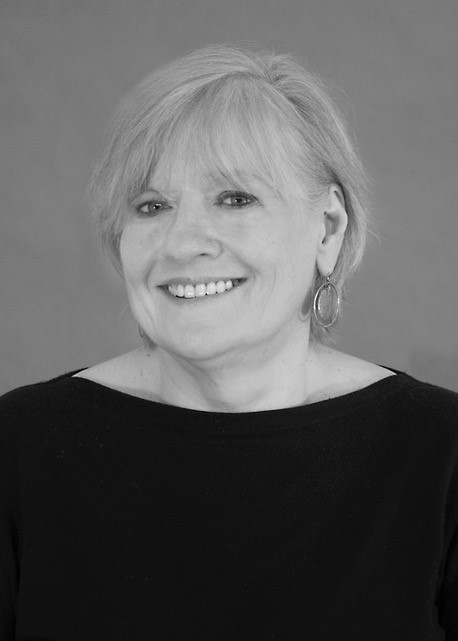After the Call: Blooming at Last
First of all, I’d like to address the Newbery-related questions I’m asked most frequently. No, the medal isn’t real gold. No, it’s too heavy to wear around my neck. No, it’s too small to frame and hang on the wall. Yes, winning it is one of the most important things that ever happened to me.
So just what did winning the Newbery Medal mean? And why? Here goes:
First of all, I’d like to address the Newbery-related questions I’m asked most frequently. No, the medal isn’t real gold. No, it’s too heavy to wear around my neck. No, it’s too small to frame and hang on the wall. Yes, winning it is one of the most important things that ever happened to me.
So just what did winning the Newbery Medal mean? And why? Here goes:
As a child, I loved to write. I wrote as soon as I could hold a crayon. I wrote songs and poems, stories and plays, greeting cards and jump-rope rhymes, and an epic poem cycle based on the life of Elvis (it remains unpublished).

Cushman holding her first typewriter with her brother Duffy. Photo courtesy of Karen Cushman.
I didn’t know anyone else who wrote, and certainly no adult who wrote for a living, so I never thought about being a writer. Writers were superhuman beings who sat down at their desks and brought forth books. I could never do that. Writing was a hobby, an outlet, a place I went to, to sort out feelings, mourn, celebrate, and ventilate. For my real job, I was going to be a schoolteacher, a tap dancer, or Elvis’s wife.
I wrote my way through high school and college and then poof! I didn’t write anymore. No stories, no plays, no poem cycles. Writing was like exercising: I wanted to do it, planned to do it, said I would do it, but never did it. I was afraid of failure, afraid of success, much too intimidated by the word writer.

 Finally, twenty-five years later, I woke one morning with an idea for a book that would not be ignored. So I wrote a few words, telling myself the whole time that it was just for me, that I wasn’t a writer, that I didn’t presume to call myself an author. I wrote word by word, line by line, page by page. It became Catherine, Called Birdy. And then I wrote a second book, The Midwife’s Apprentice.
Finally, twenty-five years later, I woke one morning with an idea for a book that would not be ignored. So I wrote a few words, telling myself the whole time that it was just for me, that I wasn’t a writer, that I didn’t presume to call myself an author. I wrote word by word, line by line, page by page. It became Catherine, Called Birdy. And then I wrote a second book, The Midwife’s Apprentice.
Not long after, the phone rang. Twice. My first two books were awarded, respectively, a 1995 Newbery Honor and the 1996 Newbery Medal. And that changed my life. Professionally, the awards mean that my books stay in print, that I get letters from enthusiastic readers who ask enthusiastic questions, and, before COVID-19, that I could travel to bookstores and schools and conferences, meet fabulous people, and eat a lot of rubber chicken. Now, to my great pleasure, I’m able to fund the Karen and Philip Cushman Late Bloomer Award to inspire others who begin to write later in life.

Cushman with 1996 Newbery committee chair Mary Beth Dunhouse.
Photo courtesy of the American Library Association Archives.
Since the Newbery, a lot more people — editors, booksellers, librarians, reviewers, readers — gather in my writing space, looking over my shoulder, watching and commenting and criticizing. Okay, I know they’re all me, but sometimes it feels very crowded in here.
Still, winning the awards has allowed me to have more confidence in myself and my writing. When it comes to writing, I no longer ask, “Can I do this?”; I say, “Hey, look, I am doing this.” You don’t have to win a Newbery or any award to be a writer. Awards, even the Newbery, don’t make you a writer, but for me, it cleared away much of the self-doubt and apprehension I had brought with me into the writing space. People pay lots of money for therapy for that.
The gift I most cherish is what the medal meant to me as a middle-aged woman who labored alone in her room, wondering what on earth she was doing spending all that time making things up: it meant I was a writer, with a purpose, a place, and a community. So I send a sincere thank-you note to anyone and everyone who has anything to do with the Newbery Award. Thank you. I owe you.
From the May/June 2022 special issue of The Horn Book Magazine: The Newbery Centennial.

RELATED
ALREADY A SUBSCRIBER? LOG IN
We are currently offering this content for free. Sign up now to activate your personal profile, where you can save articles for future viewing.






Add Comment :-
Be the first reader to comment.
Comment Policy:
Comment should not be empty !!!